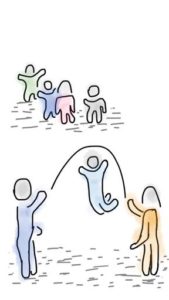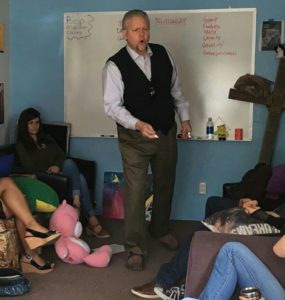I really blew it.
He was doodling. I was angry.
The high school student sat right in front of me while I was teaching.
 Doodles poured from his pen. I thought he might take some notes from time to time, but no.
Doodles poured from his pen. I thought he might take some notes from time to time, but no.
At some point, I had had it. I needed to rein in this disrespectful student.
So I called him out. “Ben! Tell me what I just said!”
Without looking up from his paper, Ben quietly repeated—word for word—what I had just said.
I was embarrassed, and for good reason. My lack of understanding about learning differences was exposed.
 A student taught me an important lesson that day: attention is not always based on eye contact nor to notes written on a page.
A student taught me an important lesson that day: attention is not always based on eye contact nor to notes written on a page.
Everyone learns in their own way. There is such a thing as learning differences.
Now don’t get me wrong. Teachers know when there is NO learning going on!
But my thinking about education had taken an abrupt turn that day.
I had too much stressed human corruption in education and not enough about human creation in education. I had grown up with the idea that eye-contact and note taking was evidence of learning. But I soon began to realize that someone may be looking at me but they were really a million miles away.
Now I let students pace in the back of the room if need be.
 My sister Jan introduced me to coloring books for adults. Ever since I have encouraged students who need a constant, physical engagement in my classroom to use them.
My sister Jan introduced me to coloring books for adults. Ever since I have encouraged students who need a constant, physical engagement in my classroom to use them.
My wife Robin, a second grade teacher, uses “bounce cords” attached to the front of desks to allow students physical release, bouncing their feet, while in their seats.
Learning differences are real.
 Professor Liz Meyer translates learning differences into teaching that’s different. Liz is one of the great undergraduate teachers I have had the privilege to see in action. Here is the first paragraph of a teaching recommendation I wrote for Liz:
Professor Liz Meyer translates learning differences into teaching that’s different. Liz is one of the great undergraduate teachers I have had the privilege to see in action. Here is the first paragraph of a teaching recommendation I wrote for Liz:
They had never had a professor like her. She seemed to become unglued when she taught. Her methods were anything but conventional. But then she went too far. She expected students to become extroverts in front of others. She made undergraduates capture attention, speak to an audience, persuade doubters, and move people to action. The class will never forget speech class, nor will they ever forget how to speak.
 Liz translates “learning differences” into teaching that’s different.
Liz translates “learning differences” into teaching that’s different.
I suggest five principles of learning differences which can encourage different teaching:
-
Acceptability: meeting people where they are – instead of we expect them to be – focuses on others
-
Generosity: willing to see others as they are, is an act of grace; reaching out, not reaching down
-
Accessibility: bridging knowledge with understanding is an act of equality for educational opportunity
-
Flexibility: teacher content knowledge makes varied communication methods possible
-
Responsibility: learning is an obligation for students – a lifelong lesson – taught by how a teacher teaches to differences.
Note to self: it might be that a student doodling in class is actually learning.
 Mark has been teaching junior high through PhD students for 35 years. He teaches a workshop entitled “Never Let ‘Em See You Comin'” focused on teaching differently for learning differences. Dr. Mark Eckel is content provider for Curriculum Trak (here), writing, speaking, and teaching on a Christian view of life and things.
Mark has been teaching junior high through PhD students for 35 years. He teaches a workshop entitled “Never Let ‘Em See You Comin'” focused on teaching differently for learning differences. Dr. Mark Eckel is content provider for Curriculum Trak (here), writing, speaking, and teaching on a Christian view of life and things.
 Dr. Mark Eckel is President of The Comenius Institute (website), spends time with Christian young people in public university (1 minute video), hosts a weekly radio program with diverse groups of guests (1 minute video), and teaches weekly at his church (video). Picture credit: snappygoat.com
Dr. Mark Eckel is President of The Comenius Institute (website), spends time with Christian young people in public university (1 minute video), hosts a weekly radio program with diverse groups of guests (1 minute video), and teaches weekly at his church (video). Picture credit: snappygoat.com



Dr. Eckel,
On the 1st day of speech class I saw a student who was on another spectrum in brain cognition than I was. I apologized right off that I might frustrate her, and that she had permission to ask for more detailed explanations at any time. I started sending her extra video links because I couldn’t cover the material in class the way she needed due to time constraints. She came by my office to thank me and to share how well it worked. I didn’t think she would watch! She caught me off guard with the comment, “I like the way your brain works because it is so different.” This nervous Nelly student with an incredibly intelligent brain, who nearly threw up on day one, is in the top five in her class and may move on in a student speech competition. She says that she is ready to “fake confidence” and thanked me for the new skill. Then she really surprised me with, “I hope you teach speech like forever, it suits you.” Guess it’s just the way our brains work. 😀